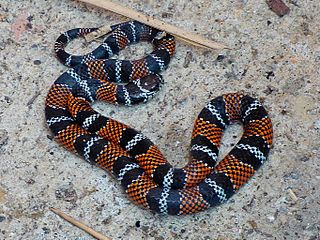
Bogertophis is a genus of New World rat snakes in the family Colubridae. The genus is endemic to the southwestern United States and northern Mexico. There are two accepted species.
Erythrolamprus ocellatus, commonly known as the Tobago false coral snake, red snake, or doctor snake is a species of colubrid snake, which is endemic to the island of Tobago.

Erythrolamprus bizona, commonly known as the double-banded false coral snake, is a species of colubrid snake, which is endemic to northern South America and Central America.

Erythrolamprus aesculapii, also known commonly as the Aesculapian false coral snake, the South American false coral snake, and in Portuguese as bacorá, or falsa-coral, is a species of mildly venomous snake in the family Colubridae. The species is endemic to South America.
False coral may refer to many species of snakes, including:

The Trans-Pecos rat snake or Davis Mountain rat snake, is a species of medium to large, nonvenomous rat snake in the family Colubridae. Bogertophis subocularis is endemic to the Chihuahuan Desert.
Atheris subocularis is a species of snake in the family Viperidae. It is endemic to Cameroon.

Erythrolamprus is a genus of colubrid snakes, commonly known as false coral snakes, native to Central America, the Caribbean, and the northern part of South America. They appear to be coral snake mimics.
Dendropsophus subocularis is a species of frog in the family Hylidae. It is found in eastern Panama and northwestern Colombia to the Magdalena River Valley. It occurs from the sea level to at least 800 m (2,600 ft), and perhaps as high as 1,650 m (5,410 ft) above sea level.
Erythrolamprus ornatus, also known commonly as the ornate ground snake and the Saint Lucia racer, is a species of snake in the family Colubridae. The species is native to the eastern Caribbean. It is the rarest snake on earth with fewer than 20 left in the wild.
The Barbados racer, also commonly known as the tan ground snake, was a species of colubrid snake that was endemic to Barbados. It is now extinct.
Placidochromis subocularis is a species of cichlid endemic to Lake Malawi and Lake Malombe where it is found where sandy and rocky zones meet or over sandy substrates at depths of from 15 to 18 metres. It feeds on aquatic invertebrates including snails. This species can reach a length of 16.2 centimetres (6.4 in) TL. It can also be found in the aquarium trade.
Shaw's dark ground snake, also known commonly as Shaw's black-backed snake, and in Spanish as candelilla, guarda caminos, and reinita cazadora, is a species of snake in the family Colubridae. The species is native to northern South America.

The military ground snake is a species of snake in the family Colubridae. The species is endemic to South America.
The Bismarck sharp-nosed blind snake is a species of snake in the Typhlopidae family. It is found in the Bismarck Archipelago and the Solomon Islands.

Anolis subocularis, the Pacific anole, is a species of lizard in the family Dactyloidae. The species is found in Mexico.
Erythrolamprus andinus is a species of snake in the family Colubridae. The species is found in Bolivia and Peru.
Erythrolamprus janaleeae is a species of snake in the family Colubridae. The species is found in Peru.







